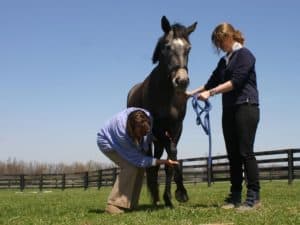Morris Animal Foundation to Raise $2.5M for University of Minnesota-Lead Consortium
Morris Animal Foundation (MAF) selected the University of Minnesota’s College of Veterinary Medicine to receive funding for the first ever Equine Consortium for Genetic Research grant. The goal of the grant is to bring together the world’s best
Morris Animal Foundation (MAF) selected the University of Minnesota’s College of Veterinary Medicine to receive funding for the first ever Equine Consortium for Genetic Research grant. The goal of the grant is to bring together the world’s best researchers in a focused, collaborative effort to improve equine health.
The consortium grant, led by University of Minnesota professors Drs. Jim Mickelson and Stephanie Valberg, received the highest score out of 27 multi-institutional applications reviewed by MAF, and could rapidly advance the health and welfare of horses worldwide. The University of Minnesota was identified as the lead institution with 32 scientists from 18 elite academic institutions throughout nine countries collaborating on the development of the proposal.
The Equine Consortium for Genetic Research will greatly enhance the ability of clinical and basic scientists to study genetic processes contributing to high priority equine diseases and enhance knowledge regarding normal cellular processes governing equine biology. The National Institutes of Health (NIH) recently awarded a research team led by scientists at the Broad Institute at the Massachusetts Institute of Technology funding to pursue the Health Horse Genome Sequencing Program, which will sequence the genome of the domestic horse, Equus caballus, along with seven different horse breeds. The Broad Institute is also one of the institutions that will collaborate with the University of Minnesota on the Equine Consortium for Genetic Research.
Researchers from the Equine Consortium for Genetic Research will use the sequenced horse genome to study and identify those genes and mutations that contribute to heritable diseases such as musculoskeletal disease, laminitis, recurrent airway obstruction, and bone disease
Create a free account with TheHorse.com to view this content.
TheHorse.com is home to thousands of free articles about horse health care. In order to access some of our exclusive free content, you must be signed into TheHorse.com.
Start your free account today!
Already have an account?
and continue reading.
Written by:
Press Release
Related Articles
Stay on top of the most recent Horse Health news with












